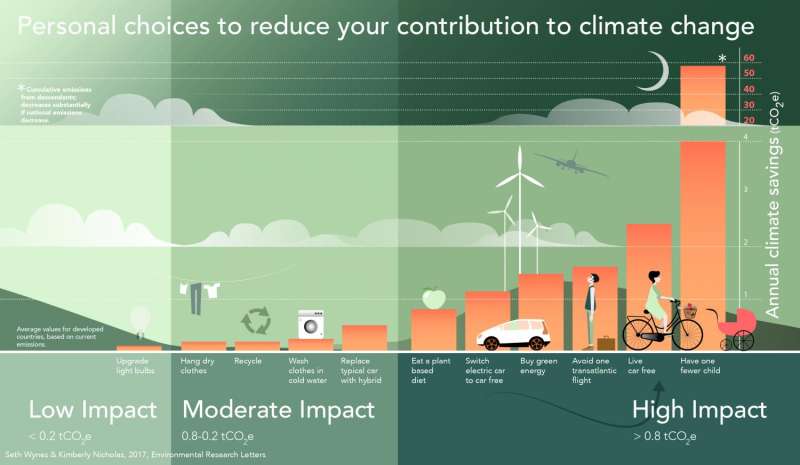The most effective individual steps to tackle climate change aren't being discussed

Governments and schools are not communicating the most effective ways for individuals to reduce their carbon footprints, according to new research.
Published today in the journal Environmental Research Letters, the study from Lund University, found that the incremental changes advocated by governments may represent a missed opportunity to reduce greenhouse gas emissions beneath the levels needed to prevent 2°C of climate warming.
The four actions that most substantially decrease an individual's carbon footprint are: eating a plant-based diet, avoiding air travel, living car-free, and having smaller families.
The research analysed 39 peer reviewed papers, carbon calculators, and government reports to calculate the potential of a range of individual lifestyle choices to reduce greenhouse gas emissions. This comprehensive analysis identifies the actions individuals could take that will have the greatest impact on reducing their greenhouse gas emissions.
Lead author Seth Wynes said: "There are so many factors that affect the climate impact of personal choices, but bringing all these studies side-by-side gives us confidence we've identified actions that make a big difference. Those of us who want to step forward on climate need to know how our actions can have the greatest possible impact. This research is about helping people make more informed choices.
"We found there are four actions that could result in substantial decreases in an individual's carbon footprint: eating a plant-based diet, avoiding air travel, living car free, and having smaller families. For example, living car-free saves about 2.4 tonnes of CO2 equivalent per year, while eating a plant-based diet saves 0.8 tonnes of CO2 equivalent a year.
"These actions, therefore, have much greater potential to reduce emissions than commonly promoted strategies like comprehensive recycling (which is 4 times less effective than a plant-based diet) or changing household lightbulbs (8 times less effective)."
The researchers also found that neither Canadian school textbooks nor government resources from the EU, USA, Canada and Australia highlight these actions, instead focussing on incremental changes with much smaller potential to reduce emissions.
Study co-author Kimberly Nicholas said: "We recognize these are deeply personal choices. But we can't ignore the climate effect our lifestyle actually has. Personally, I've found it really positive to make many of these changes. It's especially important for young people establishing lifelong patterns to be aware which choices have the biggest impact. We hope this information sparks discussion and empowers individuals," she concluded.
More information: "The Climate Mitigation Gap: Education and Government Recommendations vs. Effective Individual Actions" Wynes S and Nicholas K 2017 Environ. Res. Lett. 12 074024 , iopscience.iop.org/article/10. … 088/1748-9326/aa7541
Journal information: Environmental Research Letters
Provided by Institute of Physics


















